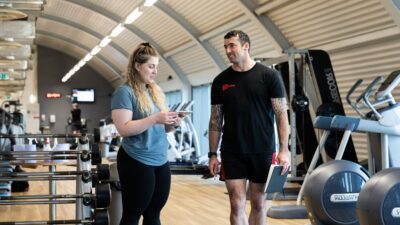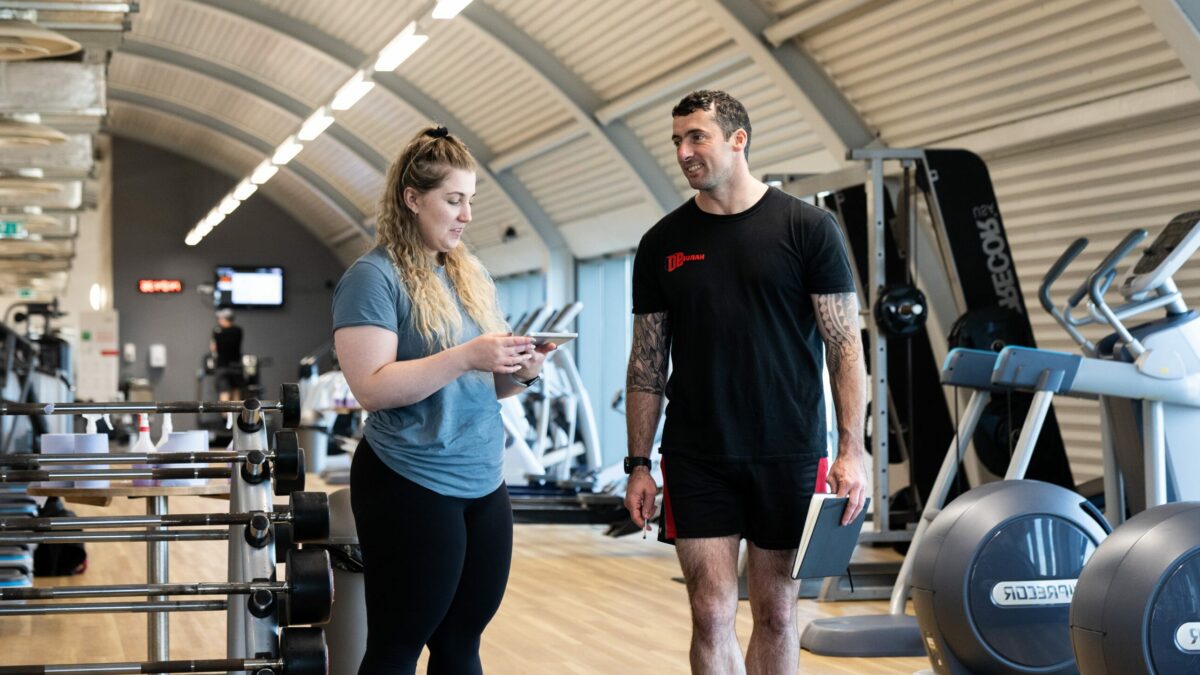



Pricing personal training sessions is a delicate balance between profitability and value. If you’re setting your rates for the first time or contemplating raising your prices, you’re probably asking yourself “What’s the right number?” You’re in business to make money but want to be affordable.
This guide will walk you through important considerations when pricing your personal training services; so you can set rates you feel confident about.
Costs of Hiring a Personal Trainer by Region
The cost of hiring a personal trainer can vary based on different factors, especially location. In the UK, the rates differ from region to region because of the variation in market dynamics, demand, and living costs.
In London, a personal trainer can charge between £50 and £169 per session. We know because we asked a London-based personal trainer, Pat Chadwick. He is the head trainer at Gymless, the world’s first website dedicated to callisthenics and bodyweight workouts.
Pat charges the following fees:
Now that we have discussed these factors let’s look at the varying costs of hiring a personal trainer in different regions in the UK.
| UK Region(s) | Average Personal Training Cost (per session) | Average Hourly rates |
| London | £50 -£150 | £100.52 |
| South East England | £40 -£80 | £60.99 |
| South West England | £30 -£60 | £16.16 |
| Midlands | £25 -£50 | £27.50 |
| North England | £20 -£45 | £16 |
| Scotland | £30 -£60 | £22.50 |
| Wales and Northern Ireland | £25 -£50 | £8.14 |
It’s important to note that these cost ranges are averages and can vary based on individual trainers.
London, the capital city, usually has higher personal training costs than other regions because of the cost of living, market demand, competition, presence of high-profile clientele, and others. The average hourly rate for personal trainers in London is £100.52, while the cost for personal training sessions usually ranges from £50 to £150 per session.
The South East region, which contains areas like Oxford and Brighton, also has higher personal training costs—although not as high as London. The average hourly rate for personal trainers in the South East is £14.99, while clients can pay between £40 and £80 for a session. Plus, this area’s high cost of living and strong fitness culture contribute to these higher prices.
Compared to London and cities in the South East, like Bath and Bristol in the South West have a lower price range for personal training services. The average cost per session in the South West falls between £30 and £60, while the average hourly rate is £16.16.
Personal trainers in cities like Birmingham and Nottingham in the Midlands region offer more accessible and affordable options. The cost per session usually ranges from £25 to £50, with an hourly rate of £27.50.
Personal trainers in cities like Leeds and Manchester in the North of England offer more training options compared to the southern regions. You can pay an average of £20 to £45 per session or an hourly rate of £16.
The costs for hiring personal trainers can vary based on the specific city in regions like Scotland. In major cities like Glasgow and Edinburgh, the average personal training cost per session is between £30 and £60, and the hourly rate is £22.50. However, the prices may be lower in more remote areas in Scotland.
Regional variations in the cost of hiring a personal trainer in Wales and Northern Ireland exist. Major cities like Belfast and Cardiff have an aligned average which ranges from £25 to £50 per session, with an average hourly rate of £8.14. Besides, you may find more affordable rates in rural areas within these regions.
As we mentioned, several factors affect the cost of personal trainers in the UK. Here, we will discuss a number of them.
Areas in the UK, like London, with higher living costs and property prices tend to have higher personal training costs. This compensates for the higher overheads compared to other regions, like Wales and Northern Ireland.
Densely populated areas, like London and Oxford, will have a higher demand for personal trainers than sparsely populated regions like Scotland. The high demand for personal trainers may increase their prices due to limited availability and competition.
Regions with a high demand for personal training services and a strong local fitness culture are likelier to have higher prices than regions without a fitness culture. These higher prices are due to the limited availability and ability of the trainer to cater to the specific needs of the local population.
Personal trainers with higher qualifications, like advanced degrees and certifications, charge higher for their services than others. Also, the level of experience they have affects the fees that they will attach to their service. For example, a personal trainer with 20+ years of experience will charge higher than one with 5 years of experience.
Personal trainers with experience with different specialisms like strength training, weight loss, rehabilitation, or sports performance may charge higher based on their skills and expertise. Some personal trainers that specialise in unique specialisms like pre-natal and post-natal training may have higher rates than others because of the distinctive nature of the specialisation and the qualifications involved.
Some personal trainers use hourly rates for their services, making short sessions less expensive than longer sessions. But some trainers also offer rates per session. So, the costs of personal trainers will vary depending on the rate model they use. Besides, some personal trainers offer clients discounts when they commit to regular sessions.
It is a no-brainer that highly reputable personal trainers in high demand will charge more than others because of their established brand and clientele.
Personal trainers usually offer individual and group sessions, and the costs vary. Where individual sessions give you more time with the trainer, they are costlier than group sessions—making group sessions more cost-effective. But, you won’t get as much personal time in group sessions, as individual sessions offer customisation and focused support. So, depending on your fitness goals, you can choose group or one-on-one sessions.
Depending on a personal trainer’s extra services, their costs may be higher or lower. For example, a personal trainer that offers meal planning, online support, nutritional guidance, and body composition analysis will cost more than one that only offers meal planning.
We noticed that other guides didn’t write this, but other essential factors that play a big role in personal trainer costs include:
Some trainers may have higher prices because they charge for the initial consultation to assess your fitness level, lifestyle, and goals to create a customised plan.
Some personal trainers may have cancellation policies that include missed session charges and notice for cancellation. These policies are usually created in a bid to protect themselves. Therefore, you must understand these policies in advance to avoid unexpected costs.
Many personal trainers offer discounts and deals if you commit to long-term training or purchase multiple sessions. These deals can come in handy in saving you a lot of money in the long haul.
In a nutshell, a personal trainer is a fitness coach providing guidance, motivation, and support to achieve all your fitness goals. They typically listen to your goals, assess your lifestyle, monitor your progress, provide nutritional insights, and develop personalised training plans that evolve as you do.
Plus, personal trainers sometimes work one-on-one with clients or with a small group.
UK Personal Trainers are required to have at least a Level 3 qualification, but many of them usually have extra qualifications and specialise in different kinds of training. With these qualifications, personal trainers ensure safe and effective workouts, regardless of whether your goal is weight loss, body re-composition, strength training, injury recovery, or general health improvement.
Make sure you check our personal training courses if you are interested in starting a career in personal training.
Whatever your goal for starting a healthy lifestyle, you must find the right personal trainer to ensure your success. You can take different steps to ensure you find the perfect match; outlined below are a few.
Before starting your search, you need to determine your reasons for looking for a personal trainer. Do you want to lose weight or build muscle?
Or do you want to improve your general health? Answering these questions will enable you to define your objectives, which will, in turn, help you find the trainer that suits your needs.
There are different websites, like the National Register of Personal Trainers, that you can use to find personal trainers using your preferences and requirements.
Here, you will find the profile of the trainers, reviews, and pricing information, making it easier for you to compare qualifications and make an informed choice.
Additionally, if you have specific fitness goals, you can use these sites to find trainers with that specialisation.
Another avenue you can use to find a personal trainer is by visiting your local gyms or fitness centres. Most of them have personal training services as part of their packages, while the ones that don’t have personal trainers for hire in-house.
Besides, gym-based personal trainers usually have varied expertise and are qualified to work with people with different fitness levels.
You can ask for recommendations from friends and family that have worked with personal trainers. Getting first-hand information about their experiences will provide insight into a trainer’s professionalism and competence.
Plus, you can ask them about the personal trainer’s specialisation, ensuring that it fits your needs.
You must ensure that your trainer has the necessary education and credentials.
Many personal training certifications are available, so you need to ensure your trainer has certificates endorsed by reputable organisations, proving that they have met specific standards of knowledge and competence.
Some examples include The Chartered Institute for the Management of Sport and Physical Activity (CIMSPA), the Royal Society for Public Health (RSPH), the Register of Exercise Professionals (REPs), and others.
After narrowing down potential personal trainers, you can schedule consultations with them, enabling you to discover their approach and your compatibility with them.
You can inquire about their training techniques, experience, availability, and client success stories. This way, you will be able to make an informed decision.
There are other practical factors you have to consider when hiring a personal trainer, like their location, rates, and availability. You need to ensure your schedule aligns with the trainer’s and that their location is convenient for you.
Plus, you need to discuss their pricing structure, from hourly rates to session rates, packages, and other additional costs for consultations and assessments.
If you have a particular trainer you want to choose but are still unsure; you should request references. Reaching out to previous and current clients and finding out their experience working with the trainer will give you all the information you need.
Besides, this information may just be what will make you decide whether or not to hire a personal trainer.
Most personal trainers have trial sessions to give potential clients first-hand experience with their training style, method, and intensity.
These sessions will enable you to determine whether their process works for you. Additionally, you need to trust your instincts when choosing a personal trainer to hire – if you don’t feel a connection with a trainer, don’t force it.
When hiring a personal trainer in the UK, you need to consider the factors that affect the cost, like experience, location, qualifications, and demand.
This way, you can make an informed decision backed by data. Plus, you need to find a trainer with the skills that align with your fitness goals – ensuring you enjoy your fitness journey.